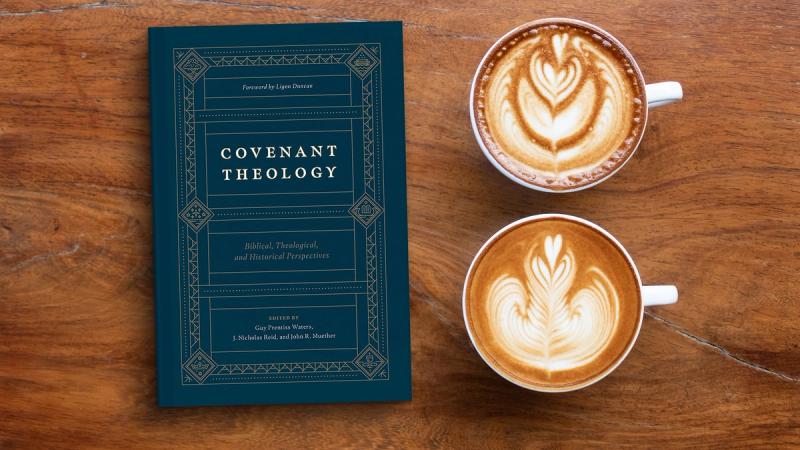The Bible has a lot to say about the covenants – the formal and binding relationships – that God makes with his people. At each major stage in the development of redemptive-history, God facilitates his relationship with his people by using a covenant. It is, therefore, of premier importance that we would pay close attention to how these covenants should inform our reading of Scripture, so that we might best understand our relationship with God and how he dispenses his grace to us in Christ.
As has long been the case in the Reformed tradition, the contributors to Covenant Theology, all of whom teach for Reformed Theological Seminary, recognize the pivotal role that the Bible gives to the covenants. They have produced a hefty and helpful collection of essays that explores this theme from the perspective of biblical theology, historical theology, and collateral studies. The book is divided into three parts, with one corresponding to each of the perspectives just mentioned.
The first section contains exegetical essays about the various covenants. The authors defend the covenant of redemption as the arrangement between Father, Son, and Spirit to secure our salvation; the covenant of works as God’s first relationship with Adam as the representative of all humanity; and the covenant of grace as God’s one unfolding plan of rescue across the whole Bible. This book is distinct in including more extended defense of the covenant of redemption and the covenant of works. The two chapters that address the covenant of works in the Old and New Testament respectively are some of the strongest essays in this collection, both of which are well versed in exegesis in conversation with systematic theology. That is in fact a defining mark of Guy Waters’ contributions to this volume and his writings in general.
Another distinct aspect of this book is the chapters that address the theme of covenant in the various writings of the New Testament: Gospels, Paul, Hebrews, and John’s letters and Revelation. These essays with their own specific aims allow the writers to devote more attention to particular uses of covenant within these genres than often happens in books on covenant theology which collapse the entire discussion into a chapter perhaps titled “covenant in the New Testament.” Although covenant is, perhaps, not equally emphasized in each genre, the particular emphasis of each essay highlights how the New Testament as a whole does include the traditional Reformed teaching on covenants, even as it applies it in distinct ways.
The second section includes several historical studies. Although overall a helpful set of essays, this part is the most mixed. The chapters on the ancient church and the Dutch Reformed tradition are some of the stronger contributions to the book, the chapter on medieval theology focuses more on the doctrine of God and the use of Scripture than covenant properly speaking. The chapter on the Reformation helpfully explores late medieval covenant theology as an issue leading to the Reformation, but it would have been helpful to see those themes spelled out at more length under their proper medieval heading. Granting that this volume was likely in preparation for some time, the chapter on post-Reformation developments in covenant theology does not seem well tuned to the most recent studies on early-modern covenant theology. Still, there is no collection of essays that covers the teaching on covenant in the whole sweep of church history in such a succinct and emphatically Reformed way as these.
The final part includes a mixture of essays from biblical studies and systematic theology. These chapters bring the Reformed view on covenant into dialogue with the contextual investigations about the background in the ancient Near East and in the first century, as well as explore how other systems of thought contrast with the Reformed approach to covenant. The essay on “new covenant theologies” is especially helpful to understand several features of an assorted set of positions developing within the Baptist framework. Given the speed at which these views have appeared, this chapter is a very useful ground clearing exercise to get readers up to speed about an array of literature that is difficult to master.
This collection of essays will serve to provoke more thought about covenant theology as research progresses. The decisive methodological emphasis is on biblical-theology, the development of themes throughout the outworking of progressive revelation. The authors come at that emphasis, however, from a decidedly Reformed perspective, and orient their arguments toward showing how Reformed theology grows out of proper exegetical study. That biblical-theology emphasis also allows this book to prepare the way for further studies in a Reformed approach to covenant theology. Even though theological conclusions are laced throughout this book, systematicians have an open door to build upon this biblical-theological goldmine to develop studies of a more categorical nature. This volume has not only made a rich contribution as it stands, but also points us ahead to the next phase of explaining Reformed covenant theology.
Harrison Perkins (PhD, Queen’s University Belfast) is the assistant pastor at London City Presbyterian Church, a visiting lecturer in systematic theology at Edinburgh Theological Seminary, and the author of Catholicity and the Covenant of Works: James Ussher and the Reformed Tradition (Oxford University Press, 2020).



